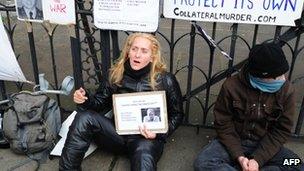Wikileaks' Julian Assange loses extradition appeal
- Published
Julian Assange outside the High Court: "I have not been charged with any crime in any country"
Wikileaks founder Julian Assange has failed in his appeal against extradition from the UK to Sweden over allegations of rape and sexual assault.
Two judges at the High Court in London decided that a previous ruling in favour of extradition must be upheld.
Swedish authorities want him to answer accusations of raping one woman and sexually molesting and coercing another in Stockholm last year.
Mr Assange's lawyers say they will appeal at the Supreme Court.
They have 14 days to bring the case to the highest court in the land, on the grounds that it raises issues of general public importance.
However, Mr Assange's legal team will first need to seek permission from the High Court to launch the appeal.
'Accurate description'
In February, District Judge Howard Riddle ruled that Mr Assange should be extradited to face investigation following a hearing at City of Westminster Magistrates' Court.
The 40-year-old Australian denies the allegations and says they are politically motivated.
However, in their ruling, external the judges, the President of the Queen's Bench Division Sir John Thomas, sitting with Mr Justice Ouseley, said that the issuing of the European arrest warrant (EAW) that led to Mr Assange's arrest and all subsequent proceedings to achieve extradition was "lawful" and "proportionate".
They dismissed Mr Assange's argument that the warrant was invalid because it had been issued by a prosecutor, and not a "judicial authority".
They also said the action of the prosecutor was subject to the independent scrutiny of Swedish judges, "which, as judges of another (EU) member state, we must respect".
The judges said: "It is clear that the allegation is that he had sexual intercourse with her when she was not in a position to consent and so he could not have had any reasonable belief that she did."
The court also rejected Mr Assange's assertion that the descriptions of the offences were not a fair and accurate description of the conduct alleged against him.
They added: "This is self evidently not a case relating to a trivial offence, but to serious sexual offences.
"Assuming proportionality is a requirement, it is difficult to see what real scope there is for the [appeal] argument in circumstances where a Swedish Court of Appeal has taken the view, as part of Swedish procedure, that an arrest is necessary."
Speaking after the judgement, Mr Assange said: "I have not been charged with any crime in any country.
"Despite this, the European arrest warrant is so restrictive that it prevents UK courts from considering the facts for a case.
"We will be considering our next steps in the days ahead."
The BBC's legal correspondent Clive Coleman said Mr Assange's difficulty has always been that he was being extradited on an EAW, which is a scheme brought in after the terrorism outrages to fast-track extraditions amongst European countries.
"The idea that underpins it is that every justice system within the scheme is as good as any other - he will get as fair a trial in Sweden as he would get here.
"That means it's very, very, difficult to resist extradition because as long as an allegation is made in relation to an extraditable offence and there's an intention to prosecute, then you pretty much have to give the person up for extradition," our correspondent said.
'Level playing field'
Wikileaks has published a mass of leaked diplomatic cables which have embarrassed several governments and international businesses.

Mr Assange's supporters said they were "outraged" at the judge's decision
American soldier Bradley Manning is being held in US custody for allegedly leaking information to the website.
Mr Assange appeared in court wearing a smart suit and Remembrance Day poppy but sat silently through the judgement, said BBC News home affairs correspondent Dominic Casciani.
Upon his arrival, Mr Assange was mobbed and police redirected him away from the crowd who had fixed to the iron railings of the court banners reading "Free Assange! Free Manning! End the wars".
Speaking after the appeal hearing, his supporters outside the court said they were "outraged" by the judges' decision.
Ciaron O'Reilly, 51, said: "Assange is probably the most amazing person in recent history who's upset so many powerful people in such a short space of time so it's obviously not a level playing field."
But extradition expert Julian Knowles QC, told BBC Russian.com he was not surprised by the decision in the Assange case.
"Although it's huddled some media attention and although some people have tried to make a lot of it, at heart it's an allegation that somebody has raped and sexually assaulted two women in Sweden," he said.
"The European Arrest Warrant system was invented so that these sorts of allegations could be dealt with speedily."
- Published24 October 2011
- Published28 September 2011
- Published2 September 2011